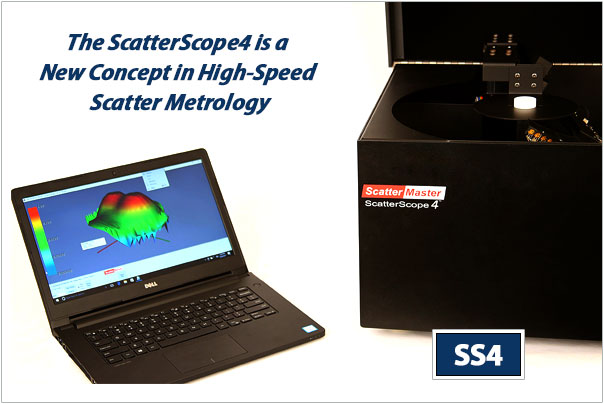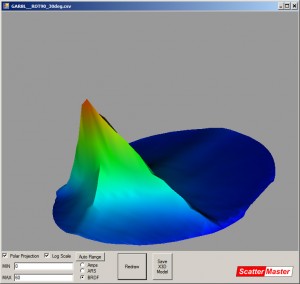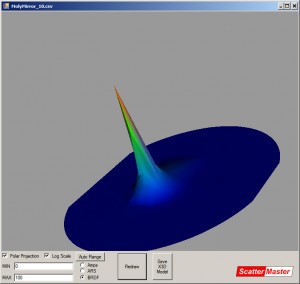The SS4 Scatterometer
A ScatterScope That Takes Full Hemispherical Scatter Measurements

This Patent Pending instrument is a new concept in high-speed scatter metrology.
To Purchase:
520-275-2644
john@thescatterworks.com
Downloads:
| Download the ScatterScope4 Data Sheet |
Introduction:
ScatterMaster LLC is proud to announce the ScatterScope™ IV scatterometer. This Patent Pending instrument is a new concept in high-speed scatter metrology. Based on operation of the Alpha unit operated in both reflection and transmission we can offer the following tentative specifications.
System Description / Measurements
Programmable scans allow sampling the reflective or transmissive hemisphere tighter than 5 degrees and less than 0.6 degrees near the specular beam (with Beam Profiler option). Initial units will have a 635 nm source and later units can be delivered with programmable laser diode wavelengths such as: 473, 532, 635 and 980 nm. Dynamic range exceeding 10 orders of magnitude with a noise floor of about 10-6/sr. This makes it capable of measuring most optics, but not polished Si wafers. Any incident angle up to 75 deg from surface normal can be used. Batch scans can be programmed at different wavelengths and incident angles. Data can be displayed in either BSDF or ARS units. Full hemisphere scans are done in 5-30 seconds depending on scan resolution. The data scans shown below were taken in 15 seconds each.
The ScatterScope 4 Additional Information:
System Description/Measurements
Programmable scans allow sampling the reflective or transmissive hemisphere tighter than 5 degrees and less than 0.6 degrees near the specular beam (with Beam Profiler option). Initial units will have a 635 nm source and later units can be delivered with programmable laser diode wavelengths such as: 473, 532, 635 and 980 nm. Dynamic range exceeding 10 orders of magnitude with a noise floor of about 10-6/sr. This makes it capable of measuring most optics, but not polished Si wafers. Any incident angle up to 75 deg from surface normal can be used. Batch scans can be programmed at different wavelengths and incident angles. Data can be displayed in either BSDF or ARS units. Full hemisphere scans are done in 5-30 seconds depending on scan resolution. The data scans shown below were taken in 15 seconds each.

![SS4_Photo[1]](http://thescatterworks.com/wp-content/uploads/SS4_Photo1-300x295.jpg)


